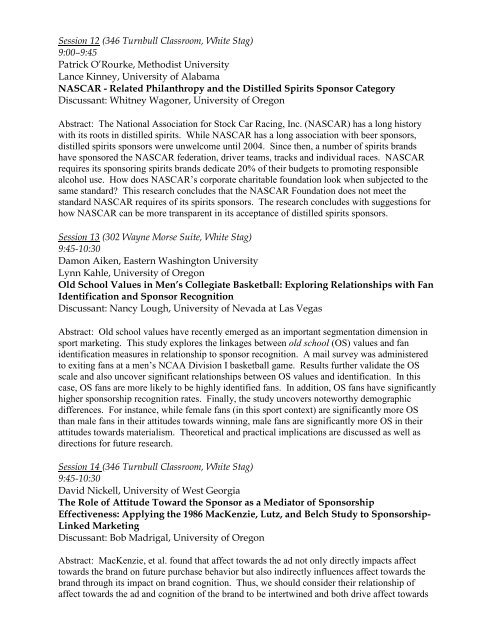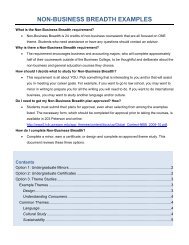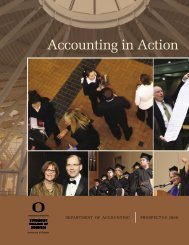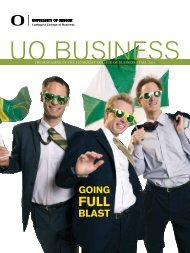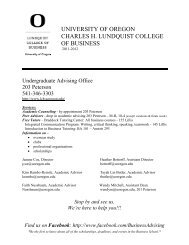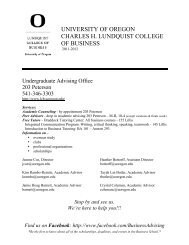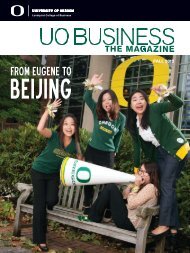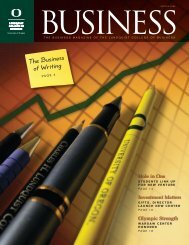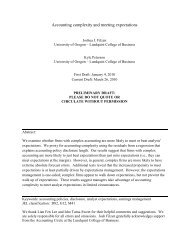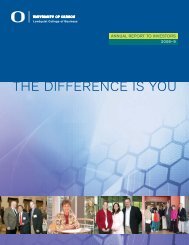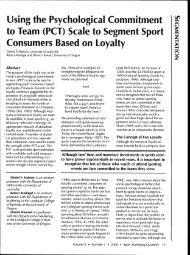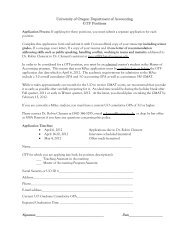Download the conference program - Lundquist College of Business ...
Download the conference program - Lundquist College of Business ...
Download the conference program - Lundquist College of Business ...
You also want an ePaper? Increase the reach of your titles
YUMPU automatically turns print PDFs into web optimized ePapers that Google loves.
Session 12 (346 Turnbull Classroom, White Stag)<br />
9:00–9:45<br />
Patrick O’Rourke, Methodist University<br />
Lance Kinney, University <strong>of</strong> Alabama<br />
NASCAR - Related Philanthropy and <strong>the</strong> Distilled Spirits Sponsor Category<br />
Discussant: Whitney Wagoner, University <strong>of</strong> Oregon<br />
Abstract: The National Association for Stock Car Racing, Inc. (NASCAR) has a long history<br />
with its roots in distilled spirits. While NASCAR has a long association with beer sponsors,<br />
distilled spirits sponsors were unwelcome until 2004. Since <strong>the</strong>n, a number <strong>of</strong> spirits brands<br />
have sponsored <strong>the</strong> NASCAR federation, driver teams, tracks and individual races. NASCAR<br />
requires its sponsoring spirits brands dedicate 20% <strong>of</strong> <strong>the</strong>ir budgets to promoting responsible<br />
alcohol use. How does NASCAR’s corporate charitable foundation look when subjected to <strong>the</strong><br />
same standard? This research concludes that <strong>the</strong> NASCAR Foundation does not meet <strong>the</strong><br />
standard NASCAR requires <strong>of</strong> its spirits sponsors. The research concludes with suggestions for<br />
how NASCAR can be more transparent in its acceptance <strong>of</strong> distilled spirits sponsors.<br />
Session 13 (302 Wayne Morse Suite, White Stag)<br />
9:45-10:30<br />
Damon Aiken, Eastern Washington University<br />
Lynn Kahle, University <strong>of</strong> Oregon<br />
Old School Values in Men’s Collegiate Basketball: Exploring Relationships with Fan<br />
Identification and Sponsor Recognition<br />
Discussant: Nancy Lough, University <strong>of</strong> Nevada at Las Vegas<br />
Abstract: Old school values have recently emerged as an important segmentation dimension in<br />
sport marketing. This study explores <strong>the</strong> linkages between old school (OS) values and fan<br />
identification measures in relationship to sponsor recognition. A mail survey was administered<br />
to exiting fans at a men’s NCAA Division I basketball game. Results fur<strong>the</strong>r validate <strong>the</strong> OS<br />
scale and also uncover significant relationships between OS values and identification. In this<br />
case, OS fans are more likely to be highly identified fans. In addition, OS fans have significantly<br />
higher sponsorship recognition rates. Finally, <strong>the</strong> study uncovers noteworthy demographic<br />
differences. For instance, while female fans (in this sport context) are significantly more OS<br />
than male fans in <strong>the</strong>ir attitudes towards winning, male fans are significantly more OS in <strong>the</strong>ir<br />
attitudes towards materialism. Theoretical and practical implications are discussed as well as<br />
directions for future research.<br />
Session 14 (346 Turnbull Classroom, White Stag)<br />
9:45-10:30<br />
David Nickell, University <strong>of</strong> West Georgia<br />
The Role <strong>of</strong> Attitude Toward <strong>the</strong> Sponsor as a Mediator <strong>of</strong> Sponsorship<br />
Effectiveness: Applying <strong>the</strong> 1986 MacKenzie, Lutz, and Belch Study to Sponsorship-<br />
Linked Marketing<br />
Discussant: Bob Madrigal, University <strong>of</strong> Oregon<br />
Abstract: MacKenzie, et al. found that affect towards <strong>the</strong> ad not only directly impacts affect<br />
towards <strong>the</strong> brand on future purchase behavior but also indirectly influences affect towards <strong>the</strong><br />
brand through its impact on brand cognition. Thus, we should consider <strong>the</strong>ir relationship <strong>of</strong><br />
affect towards <strong>the</strong> ad and cognition <strong>of</strong> <strong>the</strong> brand to be intertwined and both drive affect towards


